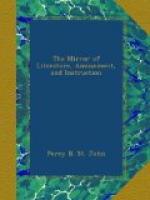The ravages committed by the opossums, in like manner, are almost equally ruinous to the hopes of the farmer, in addition to the attacks of bandicoots, kangaroo rats, and the other almost innumerable (and certainly as yet unknown to naturalists) species of small quadrupeds that every where inhabit the wild bush and underwood of this island. Mr. Nicholas, of the Clyde, accompanied by his servant, lately, in the course of half a dozen evenings, and within the range of a moderate-sized field, killed no less than 340 of these opussums in the immediate vicinity of his own house.
[The beneficial result of this surrender need not be explained. The lives and properties of the settlers will now be secure, and the wild natives become useful members of society. The passing of man from the opposite states of barbarism and civilization is one of the most pathetic episodes in the drama of human life. In the Morning Herald, where we find the above extract from a recent Hobart Town Courier, it is pertinently observed, “When we find one of those natives of Van Diemen’s Land had lost an arm which had been torn off in a trap, and that the wound was healed, the question naturally suggests itself, after all that we have heard of late about ‘anatomical science,’ what is the science of the wilderness that performed such a cure?” We fear it will puzzle the heads of all the colleges in Europe to solve this problem.]
* * * * *
THE PUBLIC JOURNALS.
LORD BYRON.
[The New Monthly Magazine promises an abundance of light, summer reading in Lady Blessington’s Conversations with Lord Byron. They are of that gay, jaunty character which editors, booksellers, and readers think so peculiarly adapted for the season. Here are a few specimens:]
JOURNAL OF CONVERSATIONS WITH LORD BYRON.
By the Countess of Blessington.
*** Our readers will recollect those letters in the second volume of Moore’s Byron, addressed to Lady B——, which confer such additional value on that work. The whole of the journal, in which those letters, given by Lady B—— to Mr. Moore, were entered, (and which journal was never shown to Mr. Moore, nor indeed till now confided to any one,) is in our hands, and will appear, from time to time, in the New Monthly, till concluded. It is full of the most varied interest, and we believe that it will be found to convey at least as natural and unexaggerated an account of Lord Byron’s character as has yet been presented to the public.




